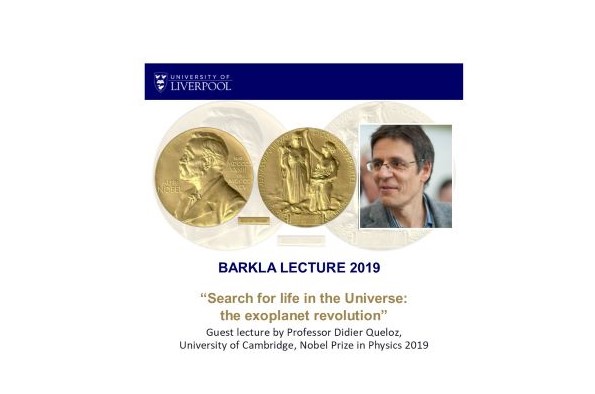
Barkla Lecture 2019 - Nobel Prize winner Didier Queloz, Guest talk 'Search for life in the Universe: the exoplanet revolution'
- Susha Parameswaran
- Suitable for: Suitable for an audience over 16 years old. The lecture is aimed at a broad audience and undergraduates are invited.
- Admission: Tickets are free but limited, please book your place to avoid disappointment click here for tickets.
- Book now
Add this event to my calendar
Click on "Create a calendar file" and your browser will download a .ics file for this event.
Microsoft Outlook: Download the file, double-click it to open it in Outlook, then click on "Save & Close" to save it to your calendar. If that doesn't work go into Outlook, click on the File tab, then on Open & Export, then Open Calendar. Select your .ics file then click on "Save & Close".
Google Calendar: download the file, then go into your calendar. On the left where it says "Other calendars" click on the arrow icon and then click on Import calendar. Click on Browse and select the .ics file, then click on Import.
Apple Calendar: The file may open automatically with an option to save it to your calendar. If not, download the file, then you can either drag it to Calendar or import the file by going to File >Import > Import and choosing the .ics file.
The Department of Mathematical Sciences at the University of Liverpool is delighted to welcome this year's winner of the Nobel Prize in Physics, Professor Didier Queloz, to deliver the annual Barkla Lecture 2019.
Professor Queloz's talk 'Search for life in the Universe: the exoplanet revolution' will explain and explore his award winning work. The Exoplanet collection identified over the last 25 years ranges from massive and big planets, like our own Jupiter, to smaller denser objects like the Earth. Considering this rich and stimulating landscape the talk will address how likely we may eventually detect life on exoplanets.
Professor Queloz will introduce the audience to exoplanet diversity. He will describe what we have learnt about their structure and their formation history. Based on recent works about the origin of life on Earth, he will present new perspectives about the minimum conditions required to allow for the formation of life's chemical building blocks. He will describe two different approaches aiming at detecting Earth like systems amenable for future work about the origins of life.
Biography
Professor Didier Queloz was at the origin of the ”exoplanet revolution” in astrophysics when in 1995, during his PhD with his supervisor, they announced the first discovery of a giant planet orbiting another star outside the solar system. This seminal discovery has spawned a revolution in astronomy and kick started the field of exoplanet research.
Over the next 25 years, Professor Queloz's scientific contributions have essentially been to make progress in detection and measurement capabilities of exoplanet systems with the goal to retrieve information on their physical structure to better understand their formation and evolution by comparison with our solar system. More recently he is directing his activity to the detection of Earth like planets and Universal life. In the course of his career he developed astronomical equipment, new observational approaches and detection algorithms. He participated and conducted programs leading to the detection of hundreds of planets, include breakthrough results. Professor Queloz is currently Professor of Physics at the University of Cambridge’s Cavendish Laboratory and Fellow of Trinity College, Cambridge.
He has participated in numerous documentaries, movies, articles, TV and radio interviews to share excitement and promote interest for science in general and particularly topics about exoplanets and life in the Universe.
Professor Didier Queloz has been jointly awarded the 2019 Nobel Prize in Physics along with Professor James Peebles and Professor Michel Mayor for their pioneering advances in physical cosmology, and the discovery of an exoplanet orbiting a solar-type star.
The annual Barkla lecture is in honour of Charles Glover Barkla, who studied Mathematics before specialising in Physics, at the University of Liverpool.
Barkla was awarded the Hughes Medal of the British Royal Society and the Nobel prize for Physics in 1917, for his discovery of the characteristic X-ray of elements.
This event is part of the University's programme of activities marking the 50th anniversary of the moon landings.
